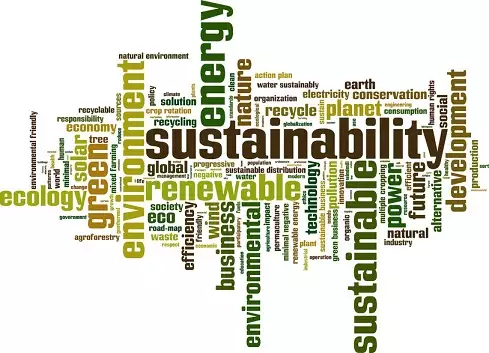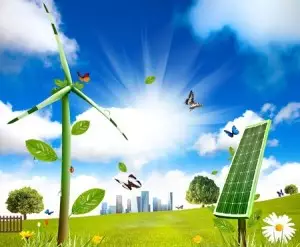In the first of a series of articles about sustainability for NetworkMilan.com, freelance writer and translator Sonia Trubia examines the increased awareness of environmental sustainability in Italy, the UK and other countries. She looks at some global data about energy use as well as the European situation. Although Italy has one of the best records in terms of renewables, among businesses in the country there is still some catching up to do with other European countries. Sonia also highlights a project in Italy which seeks to reduce the impact of cultural events on the environment, and a WWF report proposing a zero emissions model of development for the Italian region of Liguria.
Edited by Robert Dennis.
Does Sustainability leave you cold?
Many readers will grumble as soon as they read the title of this post and guess that this is just another article about renewable energy and “going green”, because, let’s face it, it’s not a very entertaining or even interesting topic for most people. Whenever someone admits that they’re not really interested in environmental issues, there is always another person who reacts in the most predictable way and asks “How can you not care about the planet we live on?”
Well, indifference is often the natural consequence of ignorance. In 2013, Ucilia Wang, a contributor to the American magazine Forbes, wrote a brief article which opened with an apparently elementary question: “Is the centre of the Earth hot or cold?” The question was asked to all those who cared to stop by the booth of a geothermal energy industry group during Earth Day, in Washington D.C., a couple of years earlier. As it turned out, most of them thought that the Earth’s inner core is cold. This answer, besides being indicative of a disturbing level of ignorance in basic scientific principles, points to a bigger issue: the general public don’t know enough to be able to really care about sustainability. Wang writes that one effective strategy to bridge such a gap is to make things more personal, for example by informing people that solar panels are an effective way for them to save money on their utility bills. But of course, that is just the beginning. Raising the public’s awareness is not easy, especially where complex numbers, graphs and technical jargon are involved. So, I have tried to summarise the most important developments in the field of clean energy, which have taken place over the past two years (numbers and percentages are a necessary evil, I’m afraid), with a particular focus on Italy and the United Kingdom.
Who gets gold in the “Green Olympics”?
In 2014, the Handelsblatt Research Institute, in Germany, published a comparative analysis of the energy policy of 24 countries, 19 of which belong to the OECD (Organisation for Economic Co-operation and Development), plus the five major global emerging economies, commonly known as BRICS (Brazil, Russia, India, China and South Africa). The research, entitled “New Impulses For The Energy Revolution” ranked the countries according to two main goals: the avoidance of CO2 emissions (the major cause of global warming and ocean acidification) and the increased use of renewable energy sources. Unsurprisingly, two Scandinavian countries, Sweden and Norway, won both top spots, followed by Switzerland, Denmark and Austria in third place. And while the UK ranked 14th, Italy made the top 10, coming 9th. As the report states, the Bel Paese owes this result to the exploitation of its many natural resources, especially “wind power and solar energy. The country also has modern gas power stations at its disposal,” though electricity costs remain high because of Italy’s reliance on imports. In spite of this, Italy ranked third, behind Denmark and the US, in the “Dynamics” category, which takes into account and compares the progress made over the previous five years in the development of sustainable solutions and renewable energies. In particular, solar energy has gained more and more importance in Italy and today, together with hydroelectric power, is the most prominent clean energy source. Furthermore, Italy was praised in the report for being the first industrial country to abandon nuclear energy after the disaster of Chernobyl (through a referendum in 1987) and the country is thought to be likely to improve even more in the field of sustainability, thanks to an ideal climate for the development of solar and wind power. The United Kingdom ranks 11th: even though it’s considered the best location for wind power in Europe and one of the most important in the world, the rate of CO2 emissions is still very high compared to other countries, and although the research suggests that progress is being made, points were deducted during the evaluation mainly because of rising energy costs.
O sole mio: solar power in Italy
A year later, in 2015, it was reported that in Italy clean forms of energy had increased to cover the whole country, with 800,000 structures contributing 38.2% of total electricity consumption. In addition, Italy is currently the country in which most solar energy is used in proportion to its electricity production. The United Kingdom, as predicted, saw wind power triumph – a source of energy which is gradually replacing gas and coal (the use of the former, in particular, dropped by a fifth in 7 years, from 2005 to 2012). While in 2013, only 15% of the nation’s electricity was produced by renewable means, in 2015 this figure had increased by 10 percentage points, meaning that a quarter of Britain’s electrical energy originated from clean sources. This implies that Great Britain will probably be able to reach the target set by the EU, demanding that by 2020, 15% of overall energy consumption be derived from renewable sources. (Although of course, this commitment to this could subsequently change depending on the result of the forthcoming referendum on EU membership).
Italian companies: could do better
Unfortunately, Italian corporations are not up to speed when it comes to environmental sustainability. In January, Corporate Knights, a media and investment advisory company based in Toronto, published its annual Global 100 Index for the year 2016, a list of the hundred most sustainable corporations in the world. According to the report, the company which managed to reduce its environmental impact the most is BMW (somewhat ironically for the German car sector, given the ongoing concerns over emissions testing). The two countries which boast the greatest number of companies listed in the Index are the United States and France, with 19 and 11 respectively. In third place comes the UK with 9 companies (from the Reckitt Benckiser Group in 9th place to Pearson in 82nd), whilst only one Italian company was included in the list: Eni, the oil, gas and consumable fuels company, which ranked 29th.
Sources for this section: Renewableuk.com and the Report on Renewable Energies by the GSE (December 2015).
Sustainable Italy
It will take time and effort not only to raise public awareness on a global scale, but also to convince people that the problems of waste and pollution are not going to disappear unless genuine solutions are found. Much is yet to be done, but all over the world there are groups of people, companies and organisations which are trying to make a difference. In the final section of this report we present some of the projects that have been established in Italy which are helping to make he country more sustainable…
ZEN and the art of environmental sustainability
In the past two years, though, both the Italian Government and local associations have made efforts to promote sustainability and the use of green energy. An example of the latter is the so-called Zen Project (Zero Impact Cultural Heritage Event Network), an international plan developed by the region of Umbria and supported by other 12 European organisations, which was presented on September 11th 2015 at the International EXPO in Milan. The project aims at analysing the environmental impact of public events, such as concerts, music and theatre festivals, conventions, exhibitions, etc., and at developing a methodology to reduce emissions and to minimise food and water waste. Chiara Dell’Aglio, the Umbrian delegate, points out that music festivals are by far the most polluting events of all, but that also artistic and literary festivals consume a high quantity of environmental resources. The Hay Literary Festival, in Wales, “consumes on average 260 tonnes of CO2″, without even taking into account the impact produced by the hundreds of visitors attending the event,” she declared. Those who are sceptical of how useful or relevant such an initiative may need to think again: according to an article published in Italian newspaper “La Repubblica”, a recent European survey conducted among public event-goers showed that 50% of them would be prepared to pay more for their entrance ticket if this contributed to reducing the environmental impact; 71% would accept reaching the venue of an event by public transport if the cost were included in the price of the ticket; and 86% would gladly recycle more during public events if there were additional green bins on site.
Putting sustainability to work in Liguria
On January 28, 2016, another study was presented in Rome: “Liguria: proposals for a zero emissions model of development.” It was commissioned by WWF Italy from ENEA, the Italian National Agency for New Technologies, Energy and Sustainable Economic Development, and its objective is to analyse a series of technological options and proposals for energy storage and transportation as well as to develop proposals for innovative sustainable solutions based on renewable energies. Though the research was conducted in a single Italian region, the model it proposes can be extended to other regions and its main goal is to show that by putting these proposals into practice thousands of new jobs could be created. In Liguria, steering the region towards a low-carbon and green economy would require an annual investment of about 391 million euro, but it could generate up to 4,500 new jobs. From an environmental point of view, this shift would involve cutting 6 million tons of CO2 annually. Half of these potential jobs are connected to the development of electrical and thermal renewable energies, while the other sector with great potential is making existing buildings more green. (The intervention would involve around ten thousand apartments to reduce waste by 60%). Donatella Bianchi, President of WWF’s Italian branch, said: “This study demonstrates clearly that it is possible to transition to a low carbon economy, fight climate change and at the same time generate long-term and sustainable employment.”
You can read and download the complete report here (In Italian).











